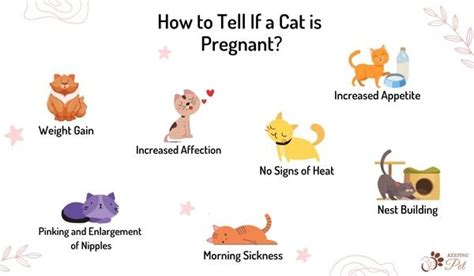How to Tell If Your Cat Is Pregnant: A Comprehensive Guide
Congratulations on potentially welcoming new kittens into your life! Determining if your cat is pregnant can be tricky, as early pregnancy signs are subtle. This comprehensive guide will walk you through the key indicators, helping you confidently determine if your feline friend is expecting.
Early Signs of Pregnancy in Cats (Weeks 1-3)
During the first few weeks, detecting pregnancy is challenging. The most noticeable changes often occur later. However, some observant cat owners may pick up on subtle behavioral shifts:
- Increased Appetite: A pregnant cat might exhibit a noticeable increase in appetite, seemingly always hungry. This isn't always a sure sign, as some cats are naturally big eaters.
- Changes in Nipples: A subtle but important sign is the enlargement and darkening of the nipples. This usually becomes more apparent around week 3. However, this can also occur due to hormonal changes, not always signifying pregnancy.
- Increased Affection: Some pregnant cats become more affectionate and cuddly, seeking extra attention and comfort from their owners.
Mid-Pregnancy Signs (Weeks 4-6)
As the pregnancy progresses, the signs become more evident:
- Weight Gain: A noticeable increase in weight is a significant indicator. You might observe a gradual rounding of the abdomen.
- Abdominal Swelling: By week 4-5, you should start noticing a distinct increase in abdominal size. This becomes increasingly prominent as the kittens grow. Gently feel your cat's abdomen; you may feel the kittens moving (but be gentle!).
- Morning Sickness (Sometimes): Some cats might experience mild nausea or vomiting, similar to morning sickness in humans, though this isn't common.
- Nest Building Behavior: As the pregnancy nears its end, your cat may start preparing a nesting area. This can involve carrying around soft materials like blankets or clothes and hiding in quiet spaces.
Late Pregnancy Signs (Weeks 7+)
In the final weeks of pregnancy, the signs become unmistakable:
- Prominent Abdomen: The abdomen becomes significantly larger and rounder, making the pregnancy easily visible.
- Fetal Movement: You can often feel the kittens moving inside the mother's abdomen.
- Behavioral Changes: The cat may become quieter, more withdrawn, or more restless as the birthing process approaches. She might start seeking a quiet, secluded nesting place.
When to Visit the Vet
While observing these signs at home is helpful, a veterinary examination is crucial for confirmation and ensuring the health of both the mother and kittens. Your vet can perform a physical exam, including palpating the abdomen to confirm the pregnancy and estimate the number of kittens. They can also provide essential prenatal care advice and monitor the health of your cat throughout the pregnancy.
Key Takeaway: While you can observe several signs at home, a veterinary visit is essential for definitive confirmation and crucial for the overall health of your pregnant cat.
Boosting Your SEO
To further boost your article's SEO, consider incorporating these additional strategies:
- Long-tail keywords: Include phrases like "signs my cat is pregnant," "how to know if my cat is pregnant early," and "cat pregnancy symptoms week by week."
- Image optimization: Use relevant images of pregnant cats and optimize them with alt text containing relevant keywords.
- Internal and external linking: Link to other relevant articles on cat care and pregnancy on your website (internal linking) and potentially to reputable veterinary resources (external linking, but avoid direct download links).
- Social media promotion: Share your article on social media platforms to increase visibility.
Remember, responsible pet ownership involves providing the best possible care. By carefully observing your cat and seeking professional veterinary guidance, you can ensure a healthy pregnancy and a smooth delivery for your feline companion and her future kittens.
